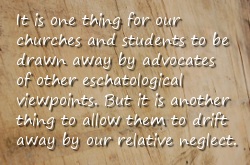Just a brief note from me (George R. Krahn) regarding Eschatology. I became disillusioned with Pre-Trib Dispensational Eschatology in the late 80's. Since then I have done a lot of study and reading about other End Times views and have come to the conclusion that the Amil view best describes what I believe presently about the consummation of all things in the end.
With that in mind read the following two blog posts written by someone who obviously still strongly believes in the Pre-Mil Pre-Trib Dispensational view.
Part 1
concluded with the observation that many young evangelicals in colleges
and universities have decided eschatology is not very important and
that many lay people share that opinion.
Scholarly embarrassment?
Furthermore, and perhaps this is in part the cause of the point just
made, it is my impression that Christian scholars, even the biblical
scholars and evangelical theologians, are not all that interested in
pursuing issues related to eschatology or even in advocating a
particular position on eschatology. This is becoming more pervasive
among premillennial dispensationalists. This may be (and I think it is)
caused by the embarrassment that many of them feel when rubbing elbows
with the wider scholarly evangelical community. It is something of a
long-standing fact of scholarly life (nearly a “tradition”) that when
one enters the “serious academy,” matters of eschatology are relegated
to relative insignificance.1
One could recount dozens of testimonies of scholars who grew up in or
were saved in churches that regarded the New Scofield Reference Bible
with the highest esteem, churches that held Prophecy Conferences
regularly if not annually, churches whose libraries were well stocked
with the books of Chafer, Walvoord, Ryrie, Pentecost, McClain, Feinberg
and the other luminaries of classic dispensationalism. But when those
young scholars went off to graduate school or seminary (even evangelical
seminaries) they were disabused of those resources and enlightened to
the profundities of Ladd, Dodd, Bruce, Barr, and Barth (!)…and these
days James Dunn and N. T. Wright among others.
As an illustration I would offer the example of the book 20th Century Theology by Stanley J. Grenz and Roger E. Olsen.2
In many ways this is a fine piece of historical theology. And while no
survey can cover everything, yet in that book none of the “old Dallas
Seminary” authors are even mentioned and the subject of eschatology
appears in only one index reference and that’s under the theology of
Rudolph Bultmann! The message is clear: “scholarly theology” is simply
not interested in the timing of the Rapture or the future of ethnic
Israel. Keep Reading >>>

No comments:
Post a Comment